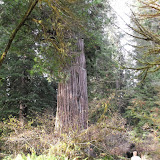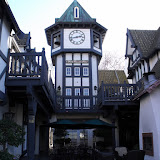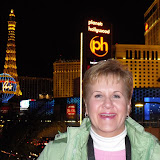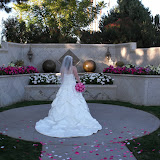Ever since I found out about the flying car that Steve Saint invented (http://mavericklsa.com/), I have had a renewed interest in the story of Steve's father, Nate Saint, and the other 4 missionaries that were martyred on Jan. 7, 1956 (the year of my birth) by the Auca Indians, as they were called when I was a child. Now we know they were members of the Waodani tribe in Ecuador. I recently watched the documentary about this story, called, "Beyond the Gates of Splendor", and the reenactment, called, "End of the Spear". I decided to do a little research on my own, and came across a few articles that I found interesting. These were all written by Steve Saint. If you haven't watched "End of the Spear", or if it has been a while since you have seen it, I highly encourage you to watch it again after reading this. It will give greater insight into the movie.
THE STORY OF THE ANGELS
A number of years ago Olive Fleming Liefeld and her second husband, Walt, visited the site in the Ecuadorian jungle where Olive's first husband, Pete, had been speared to death, along with Ed McCully, Roger Youderian, Jim Elliot and my father, Nate Saint.
Flying into a remote jungle airstrip, they were met by my father's sister, Rachel. Aunt Rachel and several members of the Waodani tribe led Olive and her husband down to the sandbar my dad named Palm Beach.
Seeing for the first time the place where her husband had been killed brought questions back to Olive's mind; questions that had gone unanswered for over thirty years. Answering her questions, with Aunt Rachel translating, was Dawa, wife of one of the attackers who was present during the attack. Dawa, still a teenager at the time, hid in the dense cane bordering the far side of the river, opposite Palm Beach, afraid to actually watch or take a more aggressive role.
As Dawa recognized Olive's interest in what had happened that memorable day, a day that shocked and transfixed much of the world, both Christian and nonChristian, she began to volunteer information that she thought might be of interest.
In the middle of her commentary she pointed to a place above the jungle canopy bordering the ridge just south of Palm Beach. "That is where we heard the Cowodi (foreigners) singing," she stated matter-of-factly. As Aunt Rachel translated, Olive stopped her, "What does she mean she heard foreigners singing above the trees?"
Dawa said they were dressed in cloth like she saw a group of Cowodi do who sang in a church she visited with Rachel in the U. S.
Olive, Walt and Aunt Rachel wondered if it could possibly have been a choir of angels. What a wonderful and humbling tribute that would have been from a gracious God who had just had five sons killed, their spear riddled bodies dumped unceremoniously in the river by the beach where they had just two days before had an exciting and completely friendly first contact with two women and one man from the same village where their killers lived.
Olive wanted to include this account of angel visitation in her book, Unfolding Destinies, so she asked me to ask the three surviving Waodani warriors who had been part of that fateful killing party for verification. The opportunity came when I flew to Ecuador to help members of the tribe bury Aunt Rachel after she died of cancer.
One by one, each of the three men told me that they saw what appeared to be lights in the same place where Dawa had said she saw the heavenly choir. They were further away, which might explain that what they saw was different. But all of them said they heard singing. Nevertheless, they were somewhat tentative in their description.
Very recently when a project was initiated to make a feature film and a docudrama about the Auca Story, the script writers wanted to include the angels singing over the Palm Beach martyrs. As I reviewed the script I felt uncomfortable including any detailed reenactment of something that I was sure had taken place but which had only been vaguely described.
In January, 2002, I was asked to take the documentary film team to Ecuador to interview the Waodani who are the other half of the story. In the interviews with four of the five remaining Waodani survivors who took part in the Palm Beach attack in which my dad and his four friends were killed, I tried to elicit more definition to what I had been told previously, but without success.
The day after wrapping up the filmed interviews with the Waodani, the film group and I were joined by two friends of ours, Kevin McAfee and Steven Curtis Chapman. They had flown out to join us to do filming for Steven's upcoming tour which will feature the Auca Story, as well as to film some footage for the documentary. Steven and I were sitting in the cooking house talking while Kimo, one of the warriors I had just interviewed, was trying to communicate with a member of the film team.
I was startled to hear music coming from the thatched long-house immediately behind us. Then I realized that Kevin was just checking out the sound equipment he had brought.
Suddenly Kimo turned towards the music and listened intently. After a minute he commented, "Manami ihindabopa," ("Just like I heard it").
I didn't understand what he was referring to until I put together the obvious fact he was referring to the music and remembered that I had recently asked him about what he had heard at Palm Beach.
Kimo resumed his sign language conversation. Suddenly he turned towards the music once again and very specifically affirmed, "I have heard that before, long ago. That is what I heard, just like that, when your father died."
I explained to Steven Curtis Chapman what Kimo was saying, then called to Kevin to hold the music at that spot. It was clear that Kimo was referring especially to one motif in the music as being what he remembered.
I invited Kimo to enter the long-house with us. Unfortunately, Kevin could not tell us specifically where on the CD the music Kimo was referring to was located. Kevin started playing various pieces on the soundtrack. I couldn't remember enough of what it sounded like to identify it. As the fifth or sixth piece started to play, Steven Curtis Chapman commented, "I think this might be it." Almost simultaneously Kimo declared, "I saw lights like stars and that is what I heard." Then he added, "When I heard that long ago, I didn't know what it was. I was afraid. Hearing it I knew we had done a bad thing there. Now, no longer living angry and hating, I see it well that you have in returning brought this back to us." (They don't have a word for instrumental music that I know of). Then he got up and left the long-house.
Kevin pulled out the CD to find the title of the piece Kimo had identified. "You won't believe this!" Kevin exclaimed. "Look," and he pointed at the CD; "It is cut #8."
Jesus told us, "Go into all the world and make disciples of all the nations." My father and his four friends joined the ranks of thousands of "God followers" who have given their lives to fulfill that commission.
The title of the soundtrack Kimo recognized as being what he heard after killing my dad and Jim, Pete, Roger and Ed, a piece written by Ron Owen especially for the documentary film (being made to tell the story of God's plan to reach a tribe of people off in the Amazon jungle who were insignificant in almost every way except that God loved them and wanted them to know they could become His children through the sacrifice of Iota, "God's only child, a son.") is "Every Tribe, Every Nation."
God has entrusted "His very good carvings" to us! But only the uninitiated or extremely unobservant are wont to believe that He doesn't still have His hand in seeing that His message reaches every tribe, every nation, every tongue and every people.
I have never questioned God's right to use my father's life. Dad turned his life over to God as a young boy. I have never asked for an apology from the men who killed him, and I have never received one. I never hated them or held anger against them so there was no forgiveness needed. I just accepted my dad was gone and with Jesus. It never occurred to me that I should forgive them for something which, though they meant for evil, God very clearly intended for good.
But as a father, I have agonized over what I have thought must have been going through Dad's mind as he lay dying out in the middle of nowhere, betrayed by the very people he and his friends had so carefully and methodically befriended. His failure would leave Marjorie (my sweet mom) a widow. He would never teach his two little boys to fly. His little girl would never sit on Daddy's lap to hear another original bedtime story. He would never again fly sick Indians to the new hospital he and Roger had been working so hard to complete. His passion for sharing the message that had set him free with people who had never heard was suddenly ended.
I have imagined all these years that this must have been the pain of Dad's last conscious minutes of life. But now I believe that I was wrong. If Dawa, Kimo, Yowe, and Mincaye heard an angelic choir from the world beyond, I have no doubt that Jim, Ed, Pete, Roger and Dad were made even more aware of their presence. They didn't die alone. Now I do believe that God sent a reception committee to sing for them and to escort them into His presence.
As I listened to music, just written, which Kimo clearly asserted he had heard at Palm Beach, my heart swelled with a sense of well-being. God took what five men could not keep and exchanged it for something they cannot lose. It's our turn now to make the same deal and give our lives away!
THE SONG
56 HENRY
In the making of "Beyond the Gates," an incredible docudrama about the death of five missionaries at the hands of "savage" Amazon jungle people, a little airplane plays a major role. The wife of the pilot calls it "the modern missionary mule" as she describes how that little airplane revolutionized the effort of taking physical and spiritual comfort to people deep in the jungle. That sweet "wife" is my mother, and the pilot, Nate Saint, who was killed when I was just a boy was my hero and my Dad.
The docudrama, however, is just a companion piece to a full-fledged feature film intended for release in theaters. As detailed plans were being made for the feature film, it became clear that a replica plane would need to be re-created to play the role of N5156H or "56 Henry". That is how my Dad's plane was affectionately known by the people who flew in it to their homes in the jungle, or to the hospital for lifesaving attention that was unavailable within the jungle. To those people and thousands of Indians living in what was often referred to as "the Green Hell", that little Piper Family Cruiser was much more than a machine. It was a friend. 56 Henry and its sandy haired pilot in his grease stained khakis were a popular duo in the Ecuadorian jungles beyond the reach of roads, medicine, and news from the outside world.
When Dad and his friends, Roger Youderian, Jim Elliot, Pete Fleming, and Ed McCully were speared to death on the little beach where they had just made the first friendly contact with the dreaded people known as "Aucas", 56 Henry was killed too. His wings and fabric were hacked with the very same machetes that the five young missionaries had dropped to the people as tokens of friendship.
Finding an exact replica was a tough but exciting order to fill. And I was asked to fill it.
The Piper aircraft company only built 237 of their model PA-14, known as the Family Cruiser. Proud PA-14 owners extolled the virtues of the Family Cruiser, and they would not sell. Finally, through a Northwest Airlines mechanic, who knew a small town pastor who knew an old friend of a proud owner who had died and left his PA-14 orphaned, I found one for sale in Northern Minnesota.
I met N4225H in a little hanger on the edge of the Great North Woods, which shares only the size of its trees with the Amazon rain forest. The air temperature was just above zero and both of our blood was thick and sluggish. All I knew for sure on our first date, that cold night at the end of 2002, was that 25H had no operable radios and we were a long adventure from her new home at the Indigenous People's Technology and Education Center in central Florida. A borrowed road atlas would serve to tell us where we were, an inexpensive fishing GPS would tell us where to go, and our eyes would provide our only weather forecast.
I made a list of what it would take to transform 4225H into 56 Henry. It would need major renovation, a new engine, instruments, modern radios, navigation equipment, and clothes. It was painted in its original white with red trim. But 56 Henry had been painted a bright "Cub" yellow to make it show up better in case of a forced landing in the endless green of the Amazon jungle. We had our work cut out for us.
Then it dawned on me. "What good would it do to spend months of time and tens of thousands of dollars to convert 25H into 56 Henry with the wrong registration number emblazoned on both of its wings and its tail?" Registration numbers on airplanes are not like license numbers on a car. On the contrary, they are very personal and unique. In an airplane, the pilot identifies himself by his plane's registration number in every radio transmission. "Chicago Center, 5156Hotel, request". "56Hotel, Chicago Center, say request."
I called the FAA to learn what had become of 56 Henry's "N number". A nice lady explained what I already knew, "The original plane that carried that "N number" was destroyed in South America in 1956." "Now N5156H belongs to a flying club owner named Joan, in Salem, Oregon."
There was no way that a stranger in Salem, Oregon, much less an entire flying club, was going to give me back my Dad's registration number 46 years after the fact. And besides, the FAA would have to approve it.
I lay awake at night imagining what opening line I would use. But I simply could not think of a good way to ask Joan for her personal "N number". Finally, I just called. After a couple days of phone tag, in which I was the only one calling, a receptionist put me through. "Hi, Joan? This is Steve Saint calling from Florida. You don't know me...."
That is as far as I got. The voice on the other end cut in, "Are you Nate Saint's son?" (No way! Out of 300 million people in the country, I call a total stranger on the opposite end of the country and she knows who I am.)
When I acknowledged that I was Nate Saint's son, Joan took over the conversation. "When my sister and I were little girls our parents wanted to be missionaries. It never worked out, but every year it seemed, almost like a family tradition, they would read us a book titled Through Gates of Splendor."
"Well, I got interested in missionary aviation and learned to fly. I joined a flying club and now I'm the president and my husband and I own it. About ten days ago, a new member joined and I asked him if he would like to read the book. He started to look at the pictures and blurted out, "Hey, the airplane in this book has our "N number"!"
"Can you believe it?" Joan queried. "I have read that book since I was a little girl and never realized that we had your Dad's "N number"!" (YES!!! YES, YES, oh YEEEESSSS!!!) The conversation was definitely moving in the right direction. Now I had my opening, but Joan was not finished with her story.
"I called my sister. Guess what? I asked her, "Remember that missionary story Mom and Dad used to read us? Well, you won't believe this but I just found out that one of our club planes has Nate Saint's registration number on it.""
Her sister responded, "You think that is a coincidence, wait til I tell you what just happened to me! Last night I went to a Steven Curtis Chapman concert and met Nate's son, Steve, and Mincaye, one of the men that killed Nate." Joan explained to me that she thought her sister was mistaken. How could she have met me? And surely she couldn't have met a member of the tribe. Why would an Amazon warrior be here in the U.S. and why would he and I have been at a concert in Washington State?
Joan and her sister were stunned. (Talk about stunned, I was speechless and amazed.) "Then it occurred to me that maybe you were a pilot, so I asked my sister. "Do you have any idea if Nate's son is a pilot too?""
"Oh sure, in the middle of the concert, they played a video as Steven Curtis sang about this story. It showed Steve Saint flying and living with the same people that killed his dad."
"That is when it occurred to me," Joan told me, "that you probably want your Dad's "N number". So, my sister and I have been trying to figure out how to get your address and now you've called. I imagine that is why you've called too, isn't it?" Joan told me that she would give me the "N number", and I sent her some video footage of 56 Henry in an old film titled "Through Gates of Splendor."
After a great deal of building at I-TEC, I took 4225H to Ohio to be painted by Missionary Maintenance Service (MMS). Several weeks later, my wife, Ginny, and I flew to Ohio to pick it up. At the hangar, they opened the doors and, "TADAA!" There in front of me was not the PA-14 that I had left with them, but "56 Henry" itself. I had not seen that old friend since the dramatic day in January of 1956, when I watched my hero fly away for the last time.
On our way back to Florida, Ginny and I decided to stop at the little airport near where my Mom lives. I called her on my cell phone. Ginny reminded me, "Remember what Mom said in the Documentary? "One thought entered my mind as I watched him (Nate) leaving, I wonder if I'll ever see that little airplane again"... and I never did.""
As Ginny and I taxied up to the fence where Mom was standing, I watched her face. She was concentrating all of her attention, trying to see Ginny and me. But, suddenly I saw her expression change. Her focus changed from Ginny and me to the little yellow airplane that we were in - and she did see 56 Henry again.
God really does write great stories, doesn't He?
MINCAYE'S PASSPORT
When my son Jessie was graduating from high school, he and Stephanie wanted me to bring grandfather Mincaye up for the graduation…which is totally impossible. He had no passport and no visa, and those people, I mean, I’m an Ecuadorian citizen...and I have been trying to renew my Ecuadorian passport. I’ve had an attorney working on it for a year and a half. And so, to get that passport, you have to have served in the Ecuadorian military…you have to go through a lot of rigamarole and red tape to do it…and so, it was impossible and we had one day to do it [get Mincaye’s passport]. I was just gonna make a token effort and get turned down.
And when we went down to the U.S. Embassy and I was filling out the form, they wanted to know your full name. And Mincaye’s full name is Mincaye…they want to know where your bank account is. The only bank Mincaye knows is where he pulls his canoe up…they want to know what your profession is, and there was nothing, address, telephone number. The only thing I could find to fill out on the whole thing was occupation, so I put “hunter/ gatherer.” And we were number ga-zillion. The consulate was just packed with people… I heard somebody [worker behind the bulletproof glass] say, “Hey, get a load of this. Occupation hunter/gatherer.” …So we went up and said, “Did you call for the hunter gatherers?” He said, “What’s your number? Oh, no, you won’t even get an interview today.”…but the Consulate was walking by…and he said, “I’ll take this interview.” So the Consulate himself sat down and started asking me questions. He said, “You know, I was in the Peace Corps here years ago. I read about some people who killed some missionaries…Everybody is always worried about what happened to the people on this side, but I always wondered what happened to those people that killed the missionaries.” And I said, “Well, one of them is looking at you through the bullet proof glass.”…He asked, “Why do you want to take the man who killed your father to the states?” You know, looking for some exploitation or something…And he said, “I’ll tell you what, I’m going to have to stick my neck out a long way to do this…but if you’ll come back this afternoon when the consulate closes, I’ll give you a one-time visa on the condition that you travel with him.” …That was ten o’clock in the morning and we had until three o’clock in the afternoon when the consulate closed. And [we] got all those papers, really, years worth of paperwork in five hours and got back there and got a visa and came to the States.
THE READER'S DIGEST CONDENSED VERSION OF THE STORY, AND MINCAYE SPEAKS TO AMERICAN AUDIENCES






